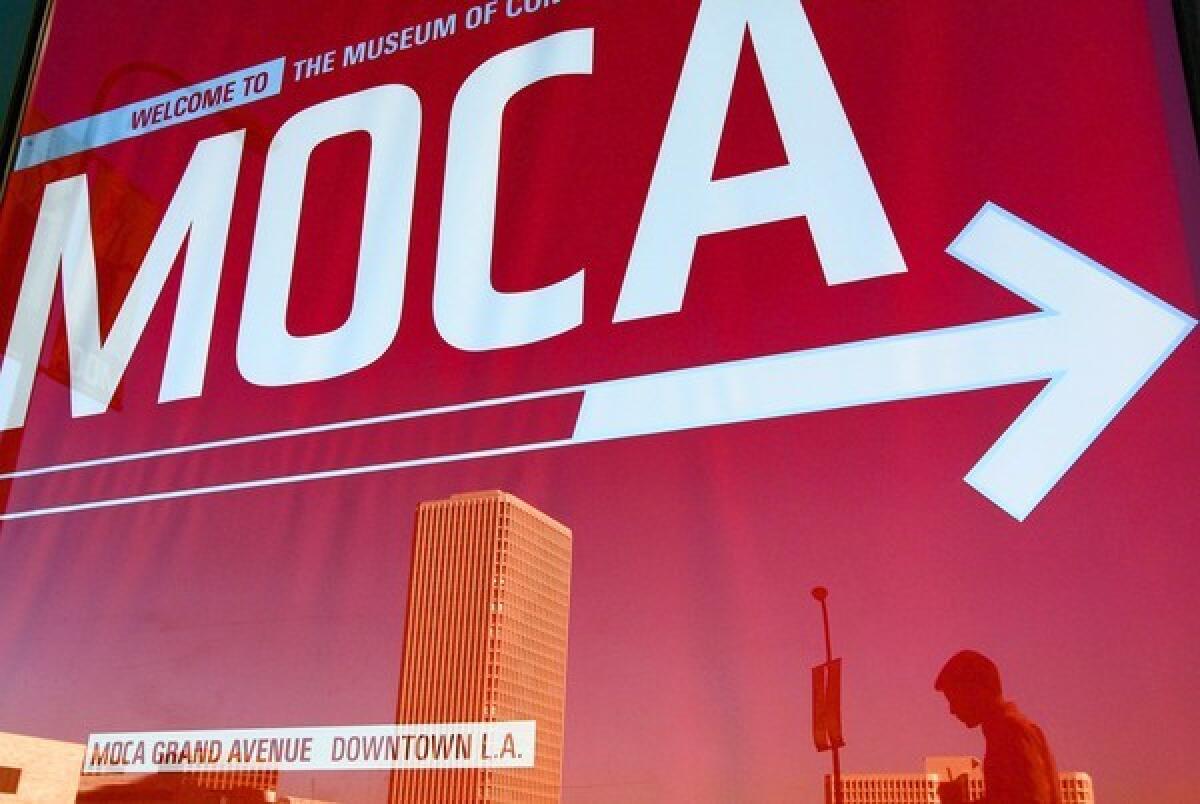MOCA employees announce a campaign to unionize

More than 120 workers at the Museum of Contemporary Art joined a growing arts-world labor movement Friday by announcing their campaign to unionize with the American Federation of State, County and Municipal Employees.
More than 50 employees presented MOCA management with a statement of intent that asked the museum to recognize their campaign. They also filed an election petition with the National Labor Relations Board.
The workers come from nearly every department at MOCA, including visitor engagement, education, exhibitions, communications, retail and audio-visual, but not curatorial. Among their motivations to unionize: pay, working conditions, and quality of internal communications or “lack of transparency” between management and employees.
“We know that forming a union is the best way to protect not only our well-being but to advocate for the people who work here for years to come,” said Christine Samples, a gallery attendant at MOCA who’s also on the union organizing committee. “I want art to be impactful for the community, and I’m looking for more investment from MOCA into the workers so we can invest more in the public’s experience of art.”
MOCA released a statement in response to the campaign: “While we respect the right of employees to decide whether or not they wish to be represented by a union, we do not believe that this union is in the best interest of our employees or the museum.”
The workers had hoped to speak with museum Director Klaus Biesenbach, but he was traveling, so they met with Mia Locks, senior curator and head of new initiatives. They crowded her office and spilled out into the hallway, smartphones raised in the air, recording the event.
“My coworkers are beautiful people who deserve better conditions to sustain their lives and art practices,” MOCA gallery attendant Lauren Kelly posted on Instagram.
Earlier this week, MOCA announced it will start free admission Jan. 11 and make a sweeping effort to be more open and accessible to visitors. “We see ourselves as a civic institution,” Biesenbach said, “as a public institution, as a resident among residents, as part of the communities we live in.”
But MOCA employees said the museum doesn’t extend that sentiment to its own workers.
“In order to fulfill MOCA’s civic responsibility,” their statement to management read, “we call on you to not only consider your duty to the community through improvements for the audience, but to afford the same sentiments toward the workers who actively embody the primary mission of the Museum of Contemporary Art, Los Angeles.”
The MOCA workers’ union effort comes three weeks after staffers at the Marciano Arts Foundation launched a short-lived union campaign. About 85% of Marciano’s visitor services associates signed cards with AFSCME. They announced their campaign on Nov. 1 only to face a mass layoff four days later. Nearly six dozen associates lost their jobs. The museum said at the time that it would be “closed to the public until further notice.” A day later the Marciano Art Foundation told The Times that it had “no present plans to reopen.”
“I’ve been organizing 17 years, and it’s a classic move from the playbook about how to bust unions,” said Carlos Vellanoweth, an AFSCME organizer who worked with the Marciano employees. “They’ll say, ‘Oh, if you go union, we’ll have to close shop.’ Well, this one actually did!”
The Marciano, which is free to the public, said the closure was due to low attendance. The museum, founded by art collectors and Guess blue jeans magnates Paul and Maurice Marciano, has not confirmed whether the closure is permanent. (At MOCA, Biesenbach’s official title is “The Maurice Marciano Director” of the museum.)
Only one major museum has successfully unionized in L.A.: the Museum of Tolerance, which is represented by AFSCME. Forty workers, mostly part-time docents and floor coordinators, retail and ticket desk employees, maintenance staff and youth education staff held an election in May 2017. A union contract was ratified in March 2018.
Josie Cha, a former docent at the Museum of Tolerance who led the union organizing, said workers wanted better working conditions, better pay and full-time hours. Most had been making around minimum wage, she said, which at organizations with 26 or more employees was $12 an hour in 2017. After bargaining, the lowest-paid employees received a 41.6% increase over the life of the four-year union contract, but the company did not agree to full-time positions.
“I’m happy people got raises,” Cha said, “but the sadness is that this is an organization that purports human rights and fair pay, and we had to twist their arm to do it.”
About MOCA unionizing, she added: “Kudos to them for doing this. It’s so difficult and intense to stand up for your rights.”
AFSCME represents services employees at more than a dozen museums nationwide, including New York’s Metropolitan Museum of Art, the Brooklyn Museum and the American Museum of Natural History.
Just this year, workers at the New Museum of Contemporary Art and the Tenement Museum in New York organized with the United Auto Workers union, and employees at the Guggenheim organized with the International Union of Operating Engineers. Security workers at the Frye Art Museum in Seattle voted to form the new Art Workers Union.
Lylwyn Esangga, organizing director at AFSCME district council 36, which represents Southern California, said her organization has been in discussions with other museums in L.A. and San Diego, though she couldn’t disclose which ones. Esangga did say that similar employment issues continue to come up.
“The trends are they’re working part time — many have more than one job — and safety is an issue,” she said. “Not OSHA requirements, but the ability to rest, to sit for a bit, because [for gallery attendants] there’s no stool. And the level of education that’s required in these positions doesn’t match the pay. Those are the things we’ve been hearing systemically.”
Museum work, Esangga added, is an “elite,” seemingly glamorous industry. “So there’s a ‘you should be happy that you get to work here’ attitude. It’s not right.”
The MOCA employees said in their statement that they “stand in solidarity” with organized museums around the country as well as “workers all over the world whose labor has been undervalued and, at times, exploited.”
“If MOCA is indeed committed to its mission of remaining contemporary and embracing the inevitability of change,” their statement read, “it is imperative to join the movement in the name of greater equity and inclusivity. Give your workers a seat at the table.”
More to Read
The biggest entertainment stories
Get our big stories about Hollywood, film, television, music, arts, culture and more right in your inbox as soon as they publish.
You may occasionally receive promotional content from the Los Angeles Times.











